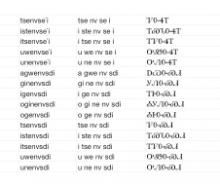
50,000 Cherokee Words
Sep 20, 2014
50,000 Cherokee Words Now Online in Dictionary, Make-A-Word
Your Grandmother’s Cherokee now has more than 50,000 entries in the Dictionary and Make-A-Word. Almost all are the Cherokee words, conjugated and ready to use, that equal a sentence in English. For example: Dagilvwisdanelvgi = I worked. (At one point in the past, and I was there, I witnessed it.)
More than 100 commonly used verbs roots are included, conjugated with ten persons doing the action in twelve tenses.
Each word also appears in negative form. So every verb root, like: working or going or cooking a meal, has 120 positive words and 120 negative words. For example, Gesdi yi dagilvwisdanelvgi = I did not work.
Cherokee words can show who is doing the action to someone else. For example, words like love, help, hit, and call are conjugated with all ten persons doing the action to the other ten persons. For example: I love you (1) = gvgeyuha. I love you two = stvgeyuha. I love you all = itsvgeyuha. I love him, her, or it = tsigeyuha. I love them (alive) = gatsigeyuha. I love them (not alive) = detsigeyuha. The word love has more than 2,000 forms for positive and negative.
Cherokee words can also indicate whether you’re talking about something that is solid and round; something flexible; something liquid; something long and rigid; or something alive. Sometimes linguists call these “classificatory.” Right now the dictionary has these in all ten persons, in all twelve tenses each for the verb roots for eating, giving, having, or picking up.
We have a few nouns and other words, but the long word/sentences—that’s what our method focuses on making. More to come!

